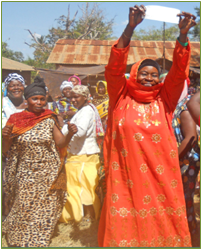
“Green jobs” is a phrase that can be used to build wealth, win votes or influence agendas. In the developing world, such jobs can be a path out of poverty.
This is the case in Tanzania’s coastal villages near Saadani National Park and Zanzibar’s Menai Bay Conservation Area. Here, USAID’s Pwani Project partnered with 1,359 households between 2010 and 2013 to reduce biodiversity threats and create sustainable livelihoods. The project addressed climate change, natural resource management, gender equity and poverty. Sustainable livelihoods that diversify income, reduce pressure on resources, and increase resilience are one method for addressing these challenges. Pwani means “coast” in Kiswahili.
For households in 21 villages, family income rose an average of 43 percent when they began various activities including bread baking, beekeeping, shell-craft jewelry making, solar-powered cell phone chargers and soap making. These businesses provided additional sources of income, fortifying household resiliency in times of stress. The income was used to pay school fees or to buy bicycles, energy-efficient stoves and furniture.
“The money I bring in makes a difference to the family. I support my brothers with school fees. My stature in the family has changed,” said jewelry maker Ikiwa Abdalla Ali.
Establishing an enterprise is one part of the livelihoods story. Success also depends on financial literacy. Working with district governments, the project established a new Savings and Credit Cooperative Society and helped strengthen existing ones in 10 villages. Conservation is one pillar of their mission, and the project provided each group with entrepreneurship training and seed money for loans.
“The capital I got has improved my livelihood to the extent that I am now able to upkeep my family,” said Mile Rashid, a farmer of sustainable crops and former charcoal dealer.
More than two-thirds of project participants took out a cooperative loan, much of which was invested in their livelihoods. The loan repayments, in turn, greatly multiply cooperative capital, creating more opportunities to escape poverty.







Comment
Make a general inquiry or suggest an improvement.